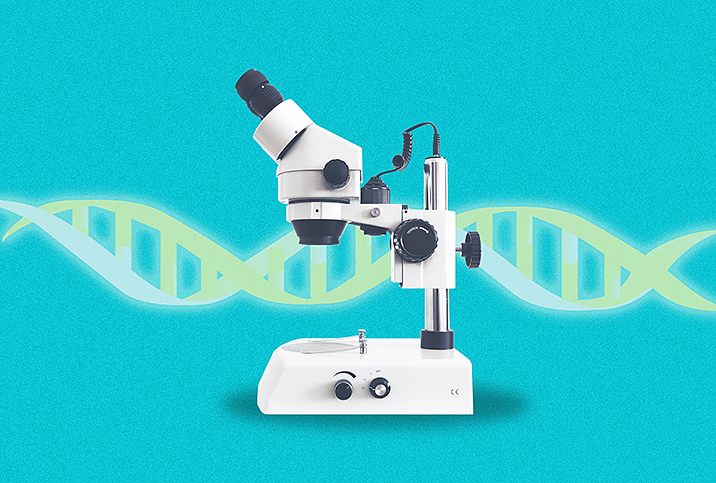Genetic Counseling Gets to the Root of Male Infertility

Maybe you're a father who had kids with a previous partner. Now, you and your new companion want to have a baby, but try as you might, she's not getting pregnant. You assume she has fertility problems. She suggests you both seek help from a genetic counselor to better understand and address fertility issues. So you proceed to a clinic and you concentrate on supporting her.
Then the counseling session unexpectedly shifts your perceptions of fertility when you learn it's you who has precluded your partner's pregnancy.
"A lot of times when the men come in, they'll be like, 'Well, it's not my problem. I've had kids already, so I'm good.' But oftentimes, over time, there can be issues that arise," explained Jason Flanagan, M.S., C.G.C., a clinical associate professor at the University of South Dakota and a genetic counselor at Sanford Health in Sioux Falls. "A lot of times, especially with things like miscarriages, [men are] completely focused on just helping their wives and they don't even realize that this potentially could be one of their issues, as well."
What is genetic counseling?
Flanagan's field of counseling can open people's eyes to the nuances of fertility and the range of methods and treatments available to assist couples on their journey toward childbirth.
Infertility genetic counseling focuses on what couples have endured, their personal histories and their inherited risk factors, which could become clues to underlying genetic complications. Wannabe parents struggling to become pregnant, interested in assisted reproductive technology (ART) or keen on preconception carrier screening can converse with infertility genetic counselors about potential options. A 2019 article in the Journal of Genetic Counseling explained that counselors play a number of roles as part of reproductive medicine healthcare teams.
While many medical practitioners predicate discussions with patients on lab results and sometimes medical and family history, Flanagan said genetic counselors consider how infertility affects a couple's life, and what family history and inherited risk factors suggest about underlying issues potentially interfering with conception. Counselors acquire information to help patients work through experiences and future plans, from both a physiological perspective and a psychological one, which most medical doctors do not.
Genetic counselors consider how infertility affects a couple's life, and what family history and inherited risk factors suggest about underlying issues potentially interfering with conception.
"Now, a psychologist might or somebody who's in psychology might, but then they don't have the genetic expertise to interpret what that result means," Flanagan said. "And so we're kind of combining the counseling and the medical part together to try to give a patient a better idea of what these results mean for them."
Infertility genetic counseling is perhaps best conducted in concert with a reproductive doctor. A reproductive endocrinologist can order lab tests, which for men usually includes a semen analysis to check sperm count, motility (movement) and morphology (shape). If something is amiss, Flanagan said, a counselor could have an in-depth discussion with the man—his partner may be brought into the conversation as appropriate—and broach subjects such as how the results affect their feelings or views on fertility. The discussion may also uncover clues as to why the results came back the way they did.
Medical care remains essential, which is why counselors such as Flanagan collaborate with doctors who can order analysis of men's ejaculate.
"If a man comes in and gives a semen analysis or a sperm sample, and we see that there's no sperm, well, that makes us concerned that there's an underlying genetic issue," Flanagan said.
His job is to then talk to the patient and ask about family history.
In deference to the vas deferens
Flanagan said a sperm-free sample typically prompts the reproductive team to check if the vas deferens in each testicle is present and intact. If they're missing or damaged, it's called a congenital bilateral absence of the vas deferens (CBAVD).
"If physical examination reveals an absence of the vas deferens, the tubes that transport the sperm to the urethra, the man would be offered testing for another genetic disorder called cystic fibrosis," said Jennifer Eaton, M.D., the director of the Women & Infants Fertility Center and the reproductive endocrinology and infertility division in the Warren Alpert Medical School at Brown University, both in Providence, Rhode Island.
Surprisingly, perhaps, cystic fibrosis, a condition often associated with lung disease, can produce CBAVD, Flanagan added. In such cases, specialists tend to see two changes in a man's CF gene. The genetic counselor can discuss this with the patient and reassure him that he could still be producing sperm. Doctors just have to go in to find it, retrieve it and, if successful, assist in making the couple biological parents.
"So having that genetic information can make the difference between doing that kind of surgery or not, or just saying we're not going to find anything," Flanagan said. "You could save a man from having to go through those extra steps if you just have this genetic piece of information for them."
Conversations about chromosomes and infertility
If results reveal a low sperm count or zero sperm in a man, areas on the Y chromosome could be deleted or missing.
"But if they're not, it's still possible that in the testicle there is sperm being made," Flanagan said, adding that a biopsy or retrieval is then on the table.
In the absence of sperm, they might discuss chromosomes—typically, there are 46.
"In men that have no sperm, one of the common things is they'll have an extra X chromosome," he said.
If the tubing is there and isn't blocked, Flanagan explained it's probably a sperm production problem, which can provoke chromosomal analysis.
According to Eaton, men with severely low or nonexistent sperm counts are often offered genetic testing, including a karyotype to test for that extra X chromosome, a condition called Klinefelter syndrome.
"They are also offered testing for Y-chromosome microdeletions, which are another known genetic cause of absent sperm," Eaton explained.
Flanagan said men with Klinefelter syndrome may need to seek a sperm donor if they and their partner are attempting to conceive. In addition to discussing a chromosome test, his role as a counselor would also be to talk with guys about what the results mean to them and how it impacts their goals.
Genetic screening and carrier testing
Genetic testing commonly tests for particular genetic abnormalities based on patient history. Genetic screening, Eaton said, involves testing for various genetic disorders, which can help inform couples about how the genes they possess and pass on could potentially affect the health of newborns.
Flanagan said carrier testing to determine any increased risk for complications with a future baby can be informative even when the family history of both partners appears benign. The partners might carry a genetic problem worth uncovering and discussing with a counselor.
Rarely, whole-genome sequencing that accounts for essentially all of a person's genes can be used to figure out what's going on. This process could become more routine in the future, Flanagan said.
Discussing treatment options
In vitro fertilization (IVF), which involves the collection of eggs fertilized with sperm to create embryos in the lab, is more common now, and a conversation with a counselor can shed light on this process. Flanagan said intracytoplasmic sperm injection (ICSI) can help men who have different genetic characteristics. He noted there is preliminary research into the conversion of somatic cells, such as skin cells, into sperm, which could prove to be an innovative method for generating seed when doing so via other mechanisms proves impossible.
Counselors in his line of work talk to men most about the prospects of locating sperm through a biopsy or aspiration—a form of sperm extraction from the vas deferens, epididymis or a testicle—or moving forward with a donor if that does not bear fruit.
"Men don't like to talk about themselves," Flanagan said. "They don't like to talk about their fertility issues. But I think it's really important that they just are open about what they're going through, and oftentimes a genetic counselor can just help them to have a reset and really think about what's best for them, and how can we get them, again, moving in the right direction to, hopefully, have a baby."


















